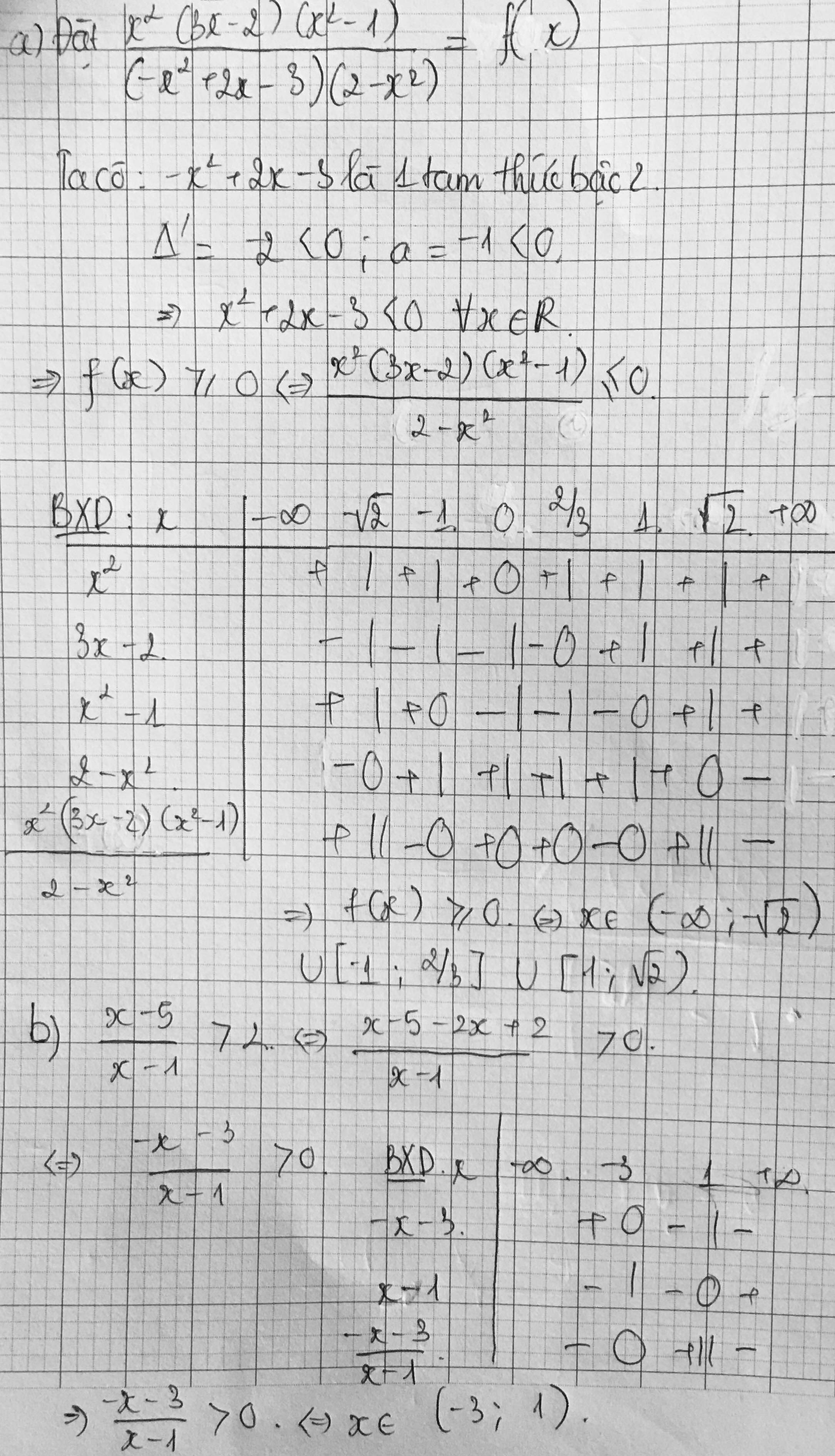Hãy nhập câu hỏi của bạn vào đây, nếu là tài khoản VIP, bạn sẽ được ưu tiên trả lời.

a, ĐKXĐ : \(D=R\)
BPT \(\Leftrightarrow x^2+5x+4< 5\sqrt{x^2+5x+4+24}\)
Đặt \(x^2+5x+4=a\left(a\ge-\dfrac{9}{4}\right)\)
BPTTT : \(5\sqrt{a+24}>a\)
\(\Leftrightarrow\left[{}\begin{matrix}\left\{{}\begin{matrix}a+24\ge0\\a< 0\end{matrix}\right.\\\left\{{}\begin{matrix}a\ge0\\25\left(a+24\right)>a^2\end{matrix}\right.\end{matrix}\right.\)
\(\Leftrightarrow\left[{}\begin{matrix}-24\le a< 0\\\left\{{}\begin{matrix}a^2-25a-600< 0\\a\ge0\end{matrix}\right.\end{matrix}\right.\)
\(\Leftrightarrow\left[{}\begin{matrix}-24\le a< 0\\0\le a< 40\end{matrix}\right.\)
\(\Leftrightarrow-24\le a< 40\)
- Thay lại a vào ta được : \(\left\{{}\begin{matrix}x^2+5x-36< 0\\x^2+5x+28\ge0\end{matrix}\right.\)
\(\Leftrightarrow-9< x< 4\)
Vậy ....
b, ĐKXĐ : \(x>0\)
BĐT \(\Leftrightarrow2\left(\sqrt{x}+\dfrac{1}{2\sqrt{x}}\right)< x+\dfrac{1}{4x}+1\)
- Đặt \(\sqrt{x}+\dfrac{1}{2\sqrt{x}}=a\left(a\ge\sqrt{2}\right)\)
\(\Leftrightarrow a^2=x+\dfrac{1}{4x}+1\)
BPTTT : \(2a\le a^2\)
\(\Leftrightarrow\left[{}\begin{matrix}a\le0\\a\ge2\end{matrix}\right.\)
\(\Leftrightarrow a\ge2\)
\(\Leftrightarrow a^2\ge4\)
- Thay a vào lại BPT ta được : \(x+\dfrac{1}{4x}-3\ge0\)
\(\Leftrightarrow4x^2-12x+1\ge0\)
\(\Leftrightarrow x=(0;\dfrac{3-2\sqrt{2}}{2}]\cup[\dfrac{3+2\sqrt{2}}{2};+\infty)\)
Vậy ...

1.
ĐK: \(x\ne7;x\ne-1;x\ne3\)
\(\dfrac{2x-5}{x^2-6x-7}\le\dfrac{1}{x-3}\left(1\right)\)
TH1: \(x< -1\)
\(\left(1\right)\Leftrightarrow\left(2x-5\right)\left(x-3\right)\ge x^2-6x-7\)
\(\Leftrightarrow2x^2-11x+15\ge x^2-6x-7\)
\(\Leftrightarrow x^2-5x+22\ge0\)
\(\Leftrightarrow\) Bất phương trình đúng với mọi \(x< -1\)
TH2: \(-1< x< 3\)
\(\left(1\right)\Leftrightarrow\left(3-x\right)\left(2x-5\right)\ge\left(7-x\right)\left(x+1\right)\)
\(\Leftrightarrow-2x^2+11x-15\ge-x^2+6x+7\)
\(\Leftrightarrow-x^2+5x-22\ge0\)
\(\Rightarrow\) vô nghiệm
TH3: \(3< x< 7\)
Khi đó \(\dfrac{2x-5}{x^2-6x-7}\le0\); \(\dfrac{1}{x-3}>0\)
\(\Rightarrow\) Bất phương trình đúng với mọi \(3< x< 7\)
TH4: \(x>7\)
\(\left(1\right)\Leftrightarrow\left(2x-5\right)\left(x-3\right)\le x^2-6x-7\)
\(\Leftrightarrow2x^2-11x+15\le x^2-6x-7\)
\(\Leftrightarrow x^2-5x+22\le0\)
\(\Rightarrow\) vô nghiệm
Vậy ...
Các bài kia tương tự, chứ giải ra mệt lắm.

1:
c: =>1/3x+2/3-x+1>x+3
=>-2/3x+5/3-x-3>0
=>-5/3x-4/3>0
=>-5x-4>0
=>x<-4/5
d: =>3/2x+5/2-1<=1/3x+2/3+x
=>3/2x+3/2<=4/3x+2/3
=>1/6x<=2/3-3/2=-5/6
=>x<=-5
2:





$a)\frac{2x}{2x^{2}-5x+3}+\frac{13x}{2x^{2}+x+3}=6$ (1)
Nhận thấy x=0 ko phải nghiệm của phương trình
Chia cả tử và mẫu của mỗi phân thức cho x, ta được:
$\frac{2}{2x-5+\frac{3}{x}}+\frac{13}{2x+1+\frac{3}{x}}=6$
Đặt $2x+\frac{3}{x}$=t
=> (1) <=> $\frac{2}{t-5}+\frac{13}{t+1}=6$
<=> $2t^{2}-13t+11=0$
Có a+b+c=2-13+11=0
=> $t_{1}=1$
$t_{2}=\frac{c}{a}=\frac{11}{2}$
* t = 1
=> $2x+\frac{3}{x}=1$
<=> $2x^{2}-x+3=0$ (vô nghiệm)
* t = $\frac{11}{2}$
=> $2x+\frac{3}{x}=\frac{11}{2}$
<=> $4x^{2}-11x+6=0$
=> $x_{1}=\frac{3}{4}$
$x_{2}=2$
Vậy phương trình có tập nghiệm S={$\frac{3}{4};2$}
b, \(x^2+\left(\dfrac{x}{x-1}\right)^2=1\)
\(\Leftrightarrow\left[x^2+\left(\dfrac{x}{x-1}\right)^2+2.x.\dfrac{x}{x-1}\right]-2.\dfrac{x^2}{x-1}-1=0\)
\(\Leftrightarrow\left(x+\dfrac{x}{x-1}\right)^2-2.\dfrac{x^2}{x-1}-1=0\)
\(\Leftrightarrow\left(\dfrac{x\left(x-1\right)+x}{x-1}\right)^2-2.\dfrac{x^2}{x-1}-1=0\)
\(\Leftrightarrow\left(\dfrac{x^2}{x-1}\right)^2-2.\dfrac{x^2}{x-1}-1=0\) (1)
Đặt : \(\dfrac{x^2}{x-1}=t\) (*) thì phương trình (1) trở thành:
\(t^2-2t-1=0\)
Ta có: \(\Delta=8>0\)
\(\Rightarrow t_1=\dfrac{2-\sqrt{8}}{2}=\dfrac{2-2\sqrt{2}}{2}=1-\sqrt{2}\)
\(t_2=\dfrac{2+\sqrt{8}}{2}=\dfrac{2+2\sqrt{2}}{2}=1+\sqrt{2}\)
Thay vào (*) rồi tìm x là xong
=.= hk tốt!!